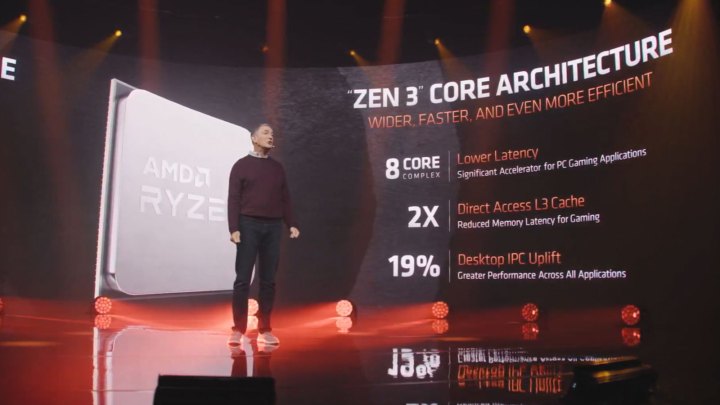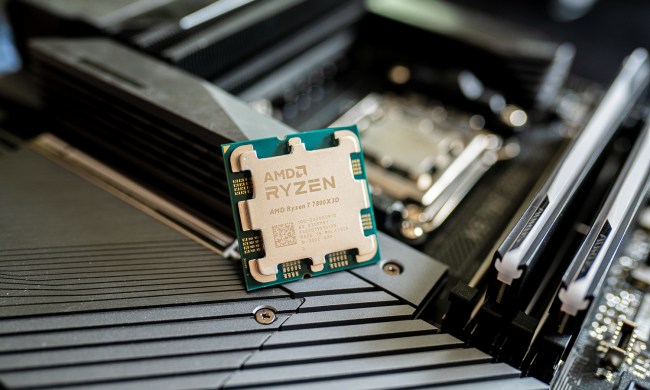After being announced nearly a month ago, AMD’s highly anticipated and Ryzen 5000 desktop processors are finally available to buy. But you may be on the fence about whether to make the plunge with Team Red and swap out your Intel CPU for AMD’s latest gaming beast.
Unfortunately, if you’ve waited this long and have sat out the early pre-orders of AMD’s latest silicon, you will find yourself waiting a bit longer. The highly coveted AMD Ryzen 5000 processors quickly sold out of their initial production run, and gamers who were unable to purchase the CPU expressed their frustration on social media channels in a situation that mirrors Nvidia’s recent GPU launches. If you’re in this camp, be sure to check out our review roundup below to see if AMD’s beastly CPU will fit your workflow and gaming needs.
Introduction

Even though the Ryzen 5000 family will be a workhorse for creatives and professionals, delivering huge generational performance improvements, AMD has its eye set squarely on gamers with this release. The Ryzen 5000 family is positioned as the processor that eliminates rival Intel’s gaming leadership, with AMD focusing on better single-core performance — an area that Intel had previously dominated — during its presentation.
The result of AMD’s honed efforts paid off. According to TechRadar‘s review of the Ryzen 9 5900X, PC buyers no longer need to choose between better single-core performance on Intel’s system or AMD’s historic dominance in multithreaded workloads. Eurogamer echoed this sentiment, stating that the gaming advantage Intel had enjoyed is now gone.
Whether you’re a gamer or are in the market for a new system for creative or professional workflows, the Ryzen 5000 family includes several different processor options spanning a wide price range.

At the entry level is the $299 six-core Ryzen 5 5600X, though more serious gamers will want to upgrade to the $449 Ryzen 7 5800X with eight cores and 16 threads or the $549 Ryzen 9 5900X, with its 12 cores and 24 threads. Enthusiasts, however, will likely eye the $799 Ryzen 9 5950X with its 16-core design that delivers AMD’s highest single- and multi-threaded performance.
New architecture

Even though the Ryzen 5000 family is designed around the same 7nm node size that debuted with the prior Zen 2 microarchitecture, AMD had made significant changes to reduce latency and bottleneck, improve clock speeds, deliver single-threaded performance uplift, and drive power efficiency with its latest Zen 3 microarchitecture.
One big change this year that contributes to the 5000 series’ better performance is AMD’s move to more cores on the processor, according to Eurogramer. During the company’s presentation, we reported that AMD Chief Technology Officer Mark Papermaster said that Zen 3 is designed on a new unified eight-core complex that allows each core to have access to the L3 memory cache, which helps to reduce any latency and bottlenecks. In sum, the chip’s new design brings a 19% uplift over Zen 2, better power efficiency, and improved single-core performance, AMD CEO Lisa Su added.
Everything from the execution unit to the chiplet configurations were tweaked and changed from Zen 2 to Zen 3, Hot Hardware noted. A 2x larger L1 branch brings a bigger buffer and more bandwidth, allowing Zen 3 to handle three loads and two stores compared to just two loads and one store per cycle on Zen 2. The new microarchitecture also has wider integer and floating point issues, larger entry store queue, and improved front-end advances that bring faster branch prediction, faster switching between OPcache and instruction cache, and improved mispredict recovery times.
Performance

In the premium segment, all the reviews we’ve come across are unanimous: AMD’s new Ryzen 9 5900X and Ryzen 9 5950X both best the performance of Intel’s gaming favorite Core i9 processor.
Using Maxon’s Cinebench R20 single-core benchmark, PC World found that Ryzen 9 5900X outpaces the 10-core Intel Core i9-10900K by 36%, with the Ryzen 9 5950X winning by an impressive 63%. Compared to the Intel Core i9-10980XE, however, the gap narrows slightly, with the Ryzen 9 5950X outpacing its rival by 19%. Yet, despite Intel’s beefier 18-core Cascade Lake hardware, this chip only manages to beat out the Ryzen 9 5900X by just 1%, the publication noted.
The Ryzen 7 5800X is no slouch either. This processor performed similarly to the Ryzen 9 5900X in overclocked performance, according to Forbes, with the higher-end Ryzen 5900X earning a slightly higher Cinebench R20 score on stock performance. Both AMD processors readily beat out the older Ryzen 9 3900X and Intel’s competing Core i9-10900K by over 100 points, the publication stated.

The uplift in performance here matches AMD’s claims, with TechRadar stating that the performance improvement from the Ryzen 9 3900X to the Ryzen 9 5900X correlates to a 19% generational performance improvement. The test also shows that the competing Intel Core i9-10900K is 18% slower than the Ryzen 9 5900X using the same Cinebench R20 benchmark. In other benchmarks, the publication noted that Intel’s gaming processor is 9% slower using the Geekbench 4 test, 12% slower in Geekbench 5, and 21% slower in Cinebench R15 single-core benchmarks.
In fact, AMD’s AM4 platform is so good that with just 12 cores, the Ryzen 9 5900X is within range of the Geekbench 4 multithreaded score of the more powerful 18-core Intel Core i9-10980XE, according to Hot Hardware, and the 16-core Ryzen 9 5950X blows past its Intel counterpart.

Across the board, a variety of synthetic tests — from PCMark to 3DMark to POV Ray and more — show that AMD’s two top Ryzen 5000 chipsets outpaced Intel’s mainstream Core i9-10900K.
When comparing Zen 2 to Zen 3 using a clock-for-clock comparison, Hot Hardware confirms that the new microarchitecture delivers better performance across a variety of benchmarks, including Speedmeter 2.0, Cinebench, Geekbench, POV-Ray, and Shadow of War. The site confirmed that AMD’s 19% generational IPC improvements are consistent with the results, with improvements ranging from 7.3% to 24.6%, depending on the benchmark used.
All these tests bode well for content creators, as both Ryzen 9 500X and 5950X lead the benchmarks, beating out Intel’s Core i9-10900K in a number of content creation tests
Gaming performance

Many of the early reviews published shortly after the Ryzen 5000 series became available for purchase tested gaming performance at 1080p or 1440p. These tests paired Intel’s and AMD’s processors to Nvidia’s discrete GPUs. AMD may be able to squeeze additional performance advantages when pairing its latest Ryzen 5000 series processors with its soon-to-be available Radeon RX 6000 GPUs.
In early testing, most reviewers agree that Intel’s performance advantage with gaming has largely been eliminated, and we’re seeing Intel’s Core i9-10900K processor neck and neck with AMD’s Ryzen 9 5900X in 1080p and 1440p across multiple titles. In some games, Intel leads by a small margin, while AMD claimed victory on other titles, so your mileage may vary.
In Far Cry New Dawn, the Ryzen 9 5900X largely matched the performance of Intel’s Core i9-10900K, and the Ryzen 9 5700X was not much behind both of its more powerful rivals in the same test at 1080p, according to Forbes, whose results were echoed by Eurogamer.

The competitiveness of AMD’s latest processors compared to Intel’s mainstream gaming CPU was also seen on titles like Wolfenstein: Youngblood, Metro Exodus, Crysis 3, and Kingdom Come Deliverance. Titles that saw a significant advantage for AMD include Assassin’s Creed Odyssey, Battlefield 5 with ray tracing disabled, and The Witcher, according to Eurogamer‘s review.
AMD has shown with its latest Zen 3 microarchitecture, you won’t be giving up any gaming performance by choosing to go with a Team Red CPU. And even scaling down to a Ryzen 7 5800X from the top-of-the-line Ryzen 9 models will still deliver a terrific gaming experience in most cases. In many of the titles tested by reviewers, the Ryzen 7 5800X scored wins against Intel’s Core i9-10900K, showing the competitiveness of AMD’s midrange processors.
Conclusion
By focusing its efforts on gaming, the Ryzen 5000 processors are helping AMD eliminate rival Intel from the conversation among enthusiast gamers. These new processors best or match the performance of their Intel counterparts across a slew of tests. Major improvements, like 24% better power efficiency, 19% generational IPC uplifts, and 2.8x more power efficiency compared to Intel’s 10th-Gen Core i9, make it easy to recommend AMD’s latest silicon, especially if you’re upgrading from an older PC. The Ryzen 9 5950X is AMD’s best processor, and one that will appeal to enthusiasts who don’t want to make any performance sacrifices, but those on a budget will do well scaling down to the Ryzen 7 5800X.



